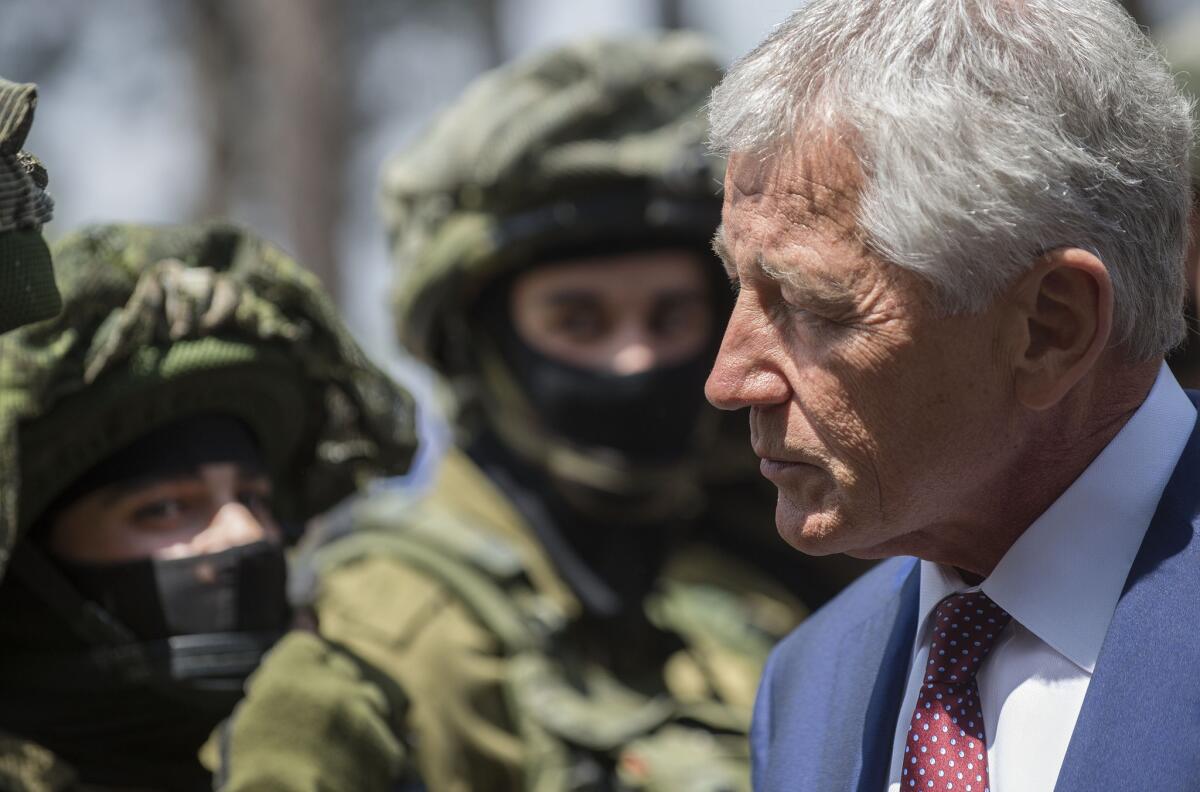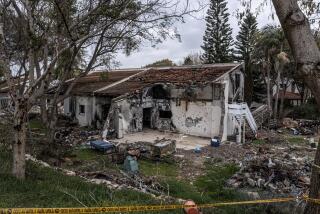Israel accuses Syria of using chemical weapons against rebels

JERUSALEM â Israel on Tuesday accused Syrian President Bashar Assadâs regime of using chemical weapons against rebels, heightening pressure on the international community to react and exposing a potential new rift with the United States over the assessment of regional threats.
The disclosure of Israelâs intelligence assessment came as U.S. Defense Secretary Chuck Hagel wrapped up a three-day visit here. U.S. officials said they remained unconvinced about whether lethal chemical weapons were used.
âThe United States continues to assess reports of chemical weapons use in Syria,â said Pentagon spokesman George Little. âThe use of such weapons would be entirely unacceptable.â
Such a determination could have far-reaching implications because President Obama has called the use of chemical weapons a âgame changer,â raising the specter of military intervention in Syria.
In Israelâs most direct accusation yet, Brig. Gen. Itai Brun, the nationâs top military intelligence analyst, said Syria used chemical weapons, probably a sarin-based nerve agent, in attacks March 19 near the cities of Aleppo and Damascus.
Speaking at a Tel Aviv security conference Tuesday morning, he said the assessment was based upon reports of victims foaming at the mouth and having constricted pupils. The disclosure followed similar assessments by Britain and France last week.
âTo the best of our professional understanding, the regime used lethal chemical warfare on a number of occasions during recent months,â Brun said, criticizing the international community for failing to respond.
âThe very fact that they have used chemical weapons without any appropriate reaction is a very worrying development, because it might signal that this is legitimate,ââ he told participants at the Institute for National Security Studies conference.
The apparently divergent U.S. and Israeli views on Syriaâs use of chemical weapons are potentially embarrassing for the Obama administration, which has been working to repair a relationship that was strained over how to respond to the Iranian nuclear threat.
During his visit, Hagel vigorously defended Israelâs right to defend itself, even though U.S. officials oppose a unilateral Israeli strike against Iran and would rather give diplomacy more time to work.
At a press conference with Hagel on Monday, Israeli Defense Minister Moshe Yaalon sounded a restrained note on Iran, voicing a view that echoed the Obama administrationâs position.
âThere are other tools to be used and to be exhausted, whether it is diplomacy, economic sanctions, even more support of the opposition in Iran,â he said.
Adding to the awkwardness was the fact that, while the security conference was taking place, Hagel was just a few miles away with Yaalon, observing a demonstration of an Israeli special forces canine unit.
A U.S. official said Israel did not share its intelligence assessment with Hagel during the visit.
In his public statements during the visit, Yaalon did not accuse Syria of using chemical weapons as explicitly as Brun did.
Israeli officials said the disclosure of their latest assessment was not timed to take place during Hagelâs trip, but that they stood behind Brunâs comments.
âHe is the [Israel Defense Forces] officer who is dealing with this threat and we are not contradicting anything he said,ââ said a senior government official who was not authorized to speak publicly.
The official would not comment on what Israel believes the international community should do in light of its assessment. Israeli officials have warned against arming Syrian rebels, fearing weapons might fall into the wrong hands.
For Israel, the red line in Syria is the transfer of chemical weapons to extremists, not their use, the official said.
âWe have always said that the most important thing to us in Syria is the transfer of dangerous weapons to extremists,ââ he said. âThatâs our focus.â
According to Israeli intelligence assessments, Syria has more than 1,000 tons of chemical stockpiles, including VX and sarin. Israel is particularly concerned that such weapons might be seized by Hezbollah fighters in Lebanon or Al-Qaeda-inspired groups in Syria.
As Syriaâs civil war enters its third year, Israel and the U.S. have been working with other countries in the region, such as Jordan and Turkey, to formulate a plan to destroy Syriaâs chemical weapons arsenal, if needed.
ALSO:
In Israel, Chuck Hagel has a one-word refrain: Friend
Kerry says NATO needs plan for Syrian chemical weapons
Analysts surprised by alleged Al Qaeda in Iran tie in Canada plot
More to Read
Sign up for Essential California
The most important California stories and recommendations in your inbox every morning.
You may occasionally receive promotional content from the Los Angeles Times.











